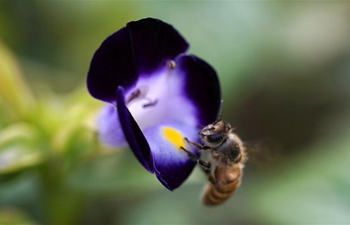WASHINGTON, June 21 (Xinhua) -- Swedish and American researchers linked molecular changes in the brain to behaviors that are central in alcohol addiction, according to a study published on Thursday in the journal Science.
According to the study, in the rats that prefer alcohol and people with alcohol addiction, the level of a protein in the amygdala is lower than the ordinary.
The researchers have developed a method in which rats learn to get an alcohol solution by pressing a lever and they offered the rats an alternative to alcohol, the sweetened water.
When the animals could choose between alcohol and sweetened water, the majority stopped making an effort to get alcohol, and chose the sweetened solution instead.
But 15 percent of the rats continued to choose alcohol, even when they could obtain another reward. This proportion is similar to the percentage of humans with alcohol addiction.
Those rats continued to press the lever to get alcohol, even if they got an unpleasant electric shock in the paw, bearing several similarities to the diagnostic criteria that are used for alcohol addiction in humans, for instance continued use despite negative consequences.
The researchers measured the expression of hundreds of genes in five areas of the brain. The largest differences they found were in the amygdala, which is important for emotional reactions.
In the rats that chose alcohol over sweetened water, one gene in particular was expressed at much lower levels. This gene is the blueprint for the protein GAT-3, a transport protein that helps maintain low levels of the inhibitory signal substance GABA around the nerve cells.
This discovery is in line with previous studies that identified changes in GABA signaling in the amygdala as rats developed alcohol dependence, according to the study.
The researchers investigated the role of reduced transport protein by knocking out GAT-3 in rats that initially clearly preferred sweetened water over alcohol.
"Decreasing the expression of the transporter had a striking effect on the behavior of these rats. Animals that had preferred the sweet taste over alcohol reversed their preference and started choosing alcohol," said Eric Augier, lead investigator in the project from Linkoping University.
The research team then collaborated with investigators at University of Texas at Austin, and analyzed GAT-3 levels in brain tissue from deceased humans.
In individuals with documented alcohol addiction, GAT-3 levels in the amygdala region were lower than in control individuals.
The discovery has the potential to help improve treatment of alcohol dependence, according to the researchers.
Baclofen, a medication that has long been used to treat increased muscular tension in certain neurological states, has also been studied for the treatment of alcohol dependence. Results have been promising, but the mechanism has been unclear.
"One of the things baclofen does is to suppress GABA release. We are currently working with a drug company to try to develop a second-generation molecule as a candidate for alcoholism medication that targets this signaling pathway," said Markus Heilig, professor of neuropsychiatry at Linkoping.

















